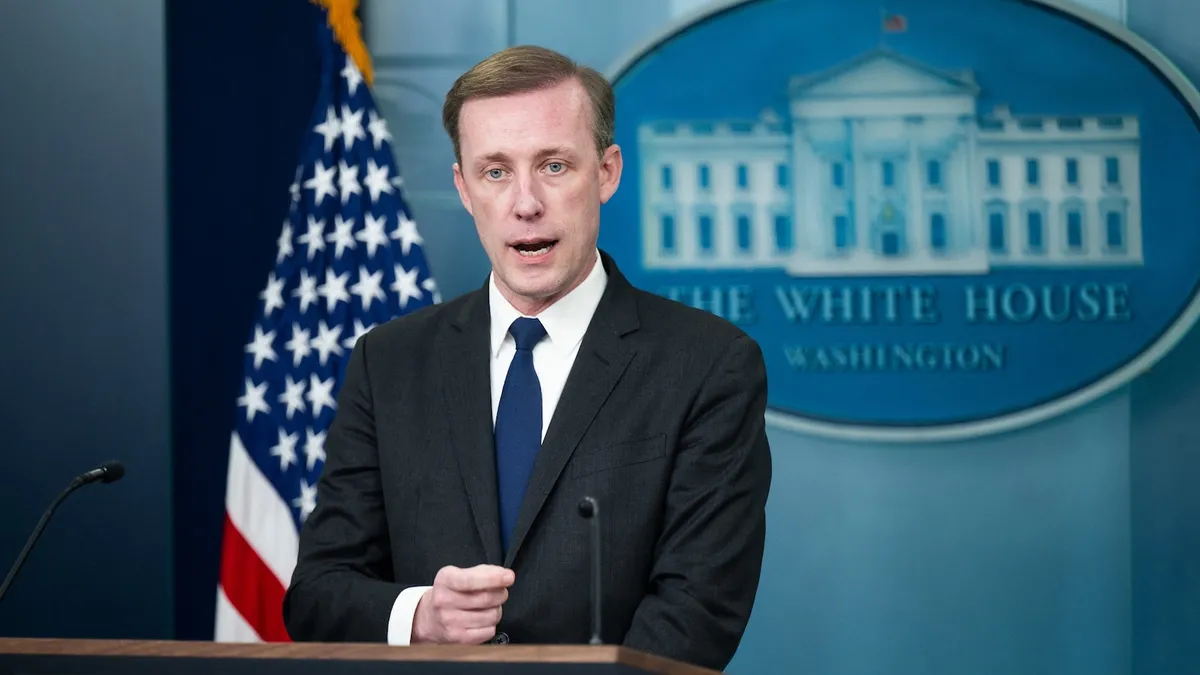
Former Biden White House national security adviser Jake Sullivan recently conveyed a sense of optimism regarding the ongoing conflict in Ukraine, following a significant meeting between President Donald Trump and Ukrainian President Volodymyr Zelenskyy in Rome. Sullivan noted that this encounter provided him with the first sliver of hope he has felt in a long time concerning the current administration's approach to the war in Ukraine.
During an interview on This Week with co-anchor Martha Raddatz, Sullivan articulated his mixed feelings about Trump's past interactions with Russia, particularly regarding Vladimir Putin. He highlighted that Trump has previously extended U.S. recognition of Crimea, which Russia illegally occupied and annexed. Sullivan noted that Trump had also assured Putin that Ukraine would not be granted NATO membership and that he could retain the territories he has unlawfully invaded.
Sullivan remarked, “What is Putin giving him? So far nothing.” However, the positive feedback from Zelenskyy regarding their recent meeting suggests that Trump may be realizing the perils of his previous stance. Zelenskyy expressed his satisfaction with the meeting, indicating hopes for outcomes that would protect the lives of Ukrainians and strive for a full and unconditional ceasefire.
Zelenskyy took to social media to describe the meeting as "very symbolic" and with the potential to be historic, provided they achieve joint results. Trump, on the other hand, adopted a more critical tone towards Putin, hinting at the possibility of imposing new sanctions on Russia. He expressed concerns that recent Russian strikes on civilian areas in Ukraine indicated that Putin may not genuinely seek to end the conflict.
Sullivan emphasized that the war was initiated by Russia, not Ukraine, and reiterated that Vladimir Putin remains the primary obstacle to establishing a ceasefire. He expressed hope that the recent meeting might signify a turning point in Trump's understanding of the situation. However, he cautioned that every time there appears to be an acknowledgment of Putin's responsibility, Trump tends to revert to pressuring Ukraine and making concessions to Russia.
Reflecting on his time since leaving the White House in January, Sullivan voiced concerns over the damage to America's credibility and trust among allies. He stated, "What I've seen in less than a hundred days is terrible damage to America's credibility and trust with our friends and allies." He added that this decline has also harmed America's appeal in political, market, and innovation sectors, all while allowing China to take advantage of the situation.
In the interview, Raddatz questioned Sullivan about the Trump administration's negotiating strategies with Russia. Sullivan countered that during his tenure, the Biden administration had engaged with Russia through various channels. He pointed out that they understood that Putin was not ready to negotiate a fair peace for Ukraine and thus focused on building leverage by supplying military equipment and tightening sanctions.
When discussing future nuclear talks between the U.S. and Iran, Sullivan reflected on how, when he was in office, Iran was at its weakest point since the 1980s. He suggested that conditions were ripe for a diplomatic solution similar to the one established during the Obama administration. Sullivan expressed hope for a new deal, indicating that he believes it should aim for a diplomatic resolution.
Sullivan found it challenging to identify positive developments from the Trump administration within the first hundred days, although he acknowledged some continuity in immigration policy and military actions against the Houthis. He stressed, however, that any progress made should not overshadow the negative consequences of recent actions.
In response to questions about controversies surrounding Defense Secretary Pete Hegseth and leaked communications, Sullivan noted that intelligence professionals have indicated that such communication should be classified. He pointed to broader issues of chaos within the Pentagon as cause for concern, stating that these circumstances necessitate serious reflection on the future of the U.S. armed forces.
Overall, Sullivan's insights reflect a complex landscape of international relations, particularly concerning the ongoing conflict in Ukraine and the role of U.S. leadership.